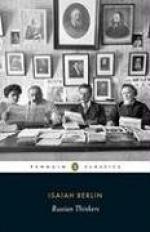|
This section contains 518 words (approx. 2 pages at 400 words per page) |

|
Tolstoy and Enlightenment Summary and Analysis
A critical consensus of the last hundred years has held that Leo Tolstoy was a great novelist, but a bad thinker. This consensus was challenged by the Russian critic Mikhailovsky in the mid-1870's, in an essay that deserves more attention. Although Tolstoy's opinions about particular writers could be idiosyncratic, he always addresses significant questions directly. Tolstoy's ideas varied less during his life than is thought. The thinker he most agrees with is Rousseau, with whom he shared a rejection of original sin and a belief that education and intellectual "experts" ruin children and the innocent, common people. He rejected both the Westernizing progressives and the nationalist Slavophils, although his temperament was more comfortable with the latter. But he sought values in the experience of the individual, rather than in any mission of Church, state or any...
(read more from the Tolstoy and Enlightenment Summary)
|
This section contains 518 words (approx. 2 pages at 400 words per page) |

|




